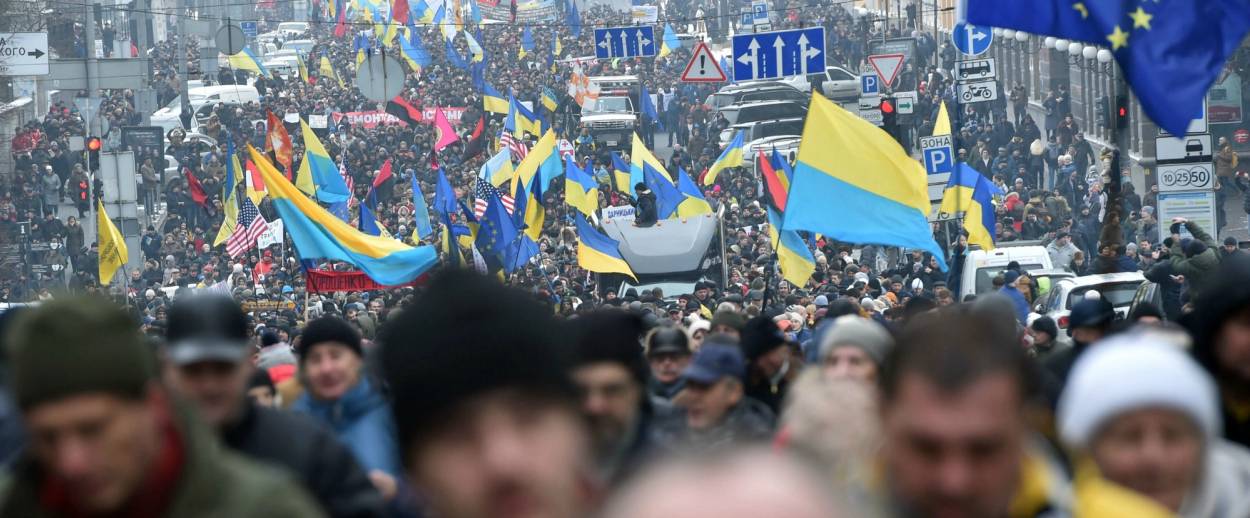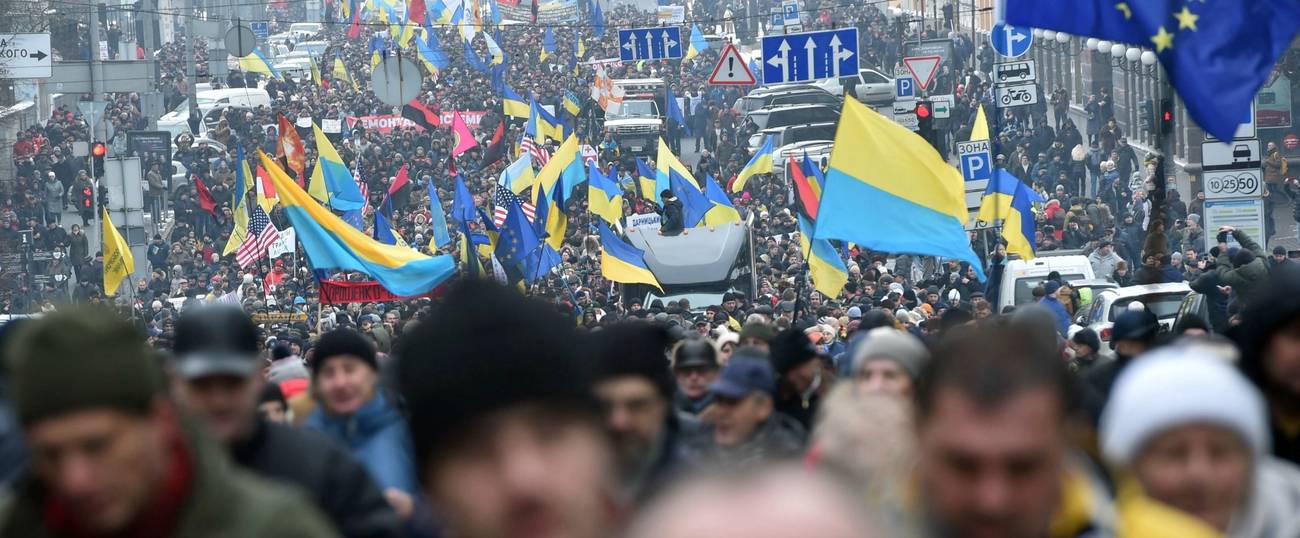In Ukrainian Politics, It’s Fear, Loathing, and Chaos
A mafioso mayor, a former president, and the Russian Bear all contribute to the state’s political’s turmoil, but the people seem resilient in the face of uncertainty




The weeklong commemorative events honoring the fourth anniversary of the Ukrainian Maidan revolution wound down late last month in Kyiv. Between February 18th and 21st, 2014, the “Berkut” special security services killed almost a hundred protesters in the center of city, precipitating the collapse of the presidency of Viktor Yanukovich. Four years later, any semblance of legal redress for the killing continues to stall, withholding emotional closure for both the society and the families of the murdered. On Ukrainska Forum, one of Ukraine’s freewheeling political debate shows, a group of half-dozen Ukrainian MPs engaged in the annual ritual of rehashing the final days of the Maidan revolution with arguments about responsibility and which side began shooting first. Last week, the authorities unveiled plans for a new museum to be dedicated to the memory of the martyred “heavenly hundred,” thus committing to the construction of a historical memorial before the actual facts of history have been thoroughly settled.
At the Munich Security Conference, which took place a week before the anniversary of the revolution, the idea of deploying an international peacekeeping operation to Eastern Ukraine was gaining traction. Diplomats representing Germany, Russia, Ukraine, and France, the four nations of the so-called “Normandy Format” tasked with resolving the situation, discussed the latest possible ceasefire deal on the conference sidelines, though at least one Ukrainian MP who attended later told me in private that the Americans were skeptical of implementing a peacekeeping operation out of fear of creating a de facto frozen conflict zone. Blasting the Russian “world hybrid war effort,” Ukraine’s president Petro Poroshenko continued his recent trend of delivering ever more rhetorically slashing speeches to audiences of international elites. His comments at Davos—where a Ukrainian house opened up for the first time to great acclaim across the street from Russia House—a few weeks prior had been equally ferocious, with him casting himself as the indispensable shining paladin of the fight against corruption.
Not everyone seemed to be convinced by the performance.
The new International Monetary Fund resident representative in Ukraine, a square jawed and bespectacled former Swedish Finance Ministry official straight out of central casting, began his tenure with the demand that the recalcitrant Ukrainian government make headway on the creation of an independent anti-corruption court. President Poroshenko remains anxious about giving up power to a legal body outside of the control of the presidential administration. He has long rebuffed Western pressure by countering with an offer of a “chamber” instead of a full-fledged court. Yet the Ukrainian elites understand that international and local demands for the creation of an anti-corruption court will have to be met sooner rather than later.
While progress on the campaign against corruption is certainly taking place, frustration with the pace of change is endemic, and Western diplomats have recently become much less patient and polite in their public utterances. Ukrainians, along with their often-derided political class, have in fact made tremendous efforts to transform their country. Yet the results of often complex or technical reforms that have long-term effects (the sorts of success stories such as the banishment of dozens of under-capitalized “Zombie” banks, some of whose primary purpose seemed to be making loans to their board of directors) are often difficult to explain to outsiders, let alone to voters. While parliament has recently implemented new health care and education bills, electricity prices are up and pensions buy less than they used to.
That the Ukrainians continue to grit their teeth and soldier on despite a general distaste for their political leadership is a testament to national cohesion and to their perseverance, demonstrating perhaps that they are the only people in Europe more stubborn than the Russians.
“It is indeed difficult for ordinary people to understand the substantive accomplishments of parliamentary reform as no one really explains the ‘why’ or the ‘what’ of those reforms, how they are made or implemented, as well as the manner in which they will benefit people eventually,” Victoria Voytsitska, a reformist MP who chairs the energy committee in parliament, explained to me last month.
The fateful phrase “Ukraine Fatigue” began to spring ever more easily from the mouths of senior European diplomats charged with the Ukrainian portfolio. Pointedly, the European Union scrapped a much hyped border project in the midst of the Maidan commemorations.
Speaking with ordinary Ukrainians, especially less educated ones, one might notice a marked uptick in the conspiracy theory idea that president Poroshenko and his circle have a vested interest in keeping the war going and actually do not want a peace settlement.
“Given the various info war campaigns, I am weary of so much of what I read these days” Ariana Gic, an independent political analyst, told me. “Unfortunately, it appears that some are easily manipulated by false narratives from various sources including disinformation campaigns from political actors (some of whom are suspected of having Russian backing) with the aim of undermining Ukraine’s government.”
The Ukrainian political class has turned its attention to the 2019 presidential race, which, with more than a year to go before voting begins, seems to be locked into an underwhelming campaign between the incumbent president and populist former Prime Minister Yulia Tymoshenko. Her luster has faded, and the entire political class is unpopular, but a populist swing is certainly not impossible, and polls this week showed her overshadowing the president for the first time. And then there’s Mikheil Saakashvili, the former Georigan president and Odessa regional governor whose sweeping denunciations of the government in Kiyv have caused the most trouble to the sitting government. Saakashvilli, who has been appointed by Poroshenko to the governorship of Odessa, had resigned from his post, and soon began to attack the government.
In fact, the deportation of Saakashvili in the days leading up to the commemoration events WAS widely seen as the opening salvo in the 2019 presidential campaign. The deportation of Saakashvili, who had forced his way over the Polish border in September after having been stripped of his Ukrainian citizenship by presidential decree, had been long coming and was the conclusion of an ignoble saga that made all involved look bad.
Saakashvili was taken by force in broad day light. Having exhausted his legal appeals, the presidential administration would take no chances after Saakashvili had previously (and often comically) resisted arrest. A group of commandos in balaclavas swooped into a Georgian restaurant where the former Georgian president was having lunch to drag him by the hair onto a private plane chartered for Warsaw. A photo of the unpaid lunch bill began circulating over social media along with inevitable jokes about “Misha’s last supper.”
Appearing in Holland, where the local government granted him a visa as he is married to a Dutch citizen, Saakashvili was reduced to filming Facebook videos of himself sitting in front of an Amsterdam canal to rally his troops into battle from afar. In any case, THE long planned grand protest, which coincided with the anniversary of the commencement of the killings on February 18th, surely did not realize his expectations of mass revolutionary uprising. No more than five thousand protesters showed up for the revolution. Either out of fear, prudence, or a dash of rigging the game, the Kyiv authorities took no chances, with most of the major metro stations in central Kyiv closed down for the duration of the protests. They likely could have avoided the effort. The regional protests, organized across the regional capitals were no more impressive. No one seemed especially surprised when the Ukrainian Border Guard announced a ban on Saakashvili reentering the country until February, 2021. That is long after the election.
The last time I spoke with Saakashvili was on a Sunday afternoon in late December when we were both attending the same play in Kyiv. He was in an uncharacteristically subdued mood. It was obvious that the clock was running down on his appeals of the deportation notice but he swore to fight on. He assured me that he would return again
Over social media, the journalist/political analyst class broke into jocular debate over the odds of Saakashvili staging another triumphantly illegal return before the Presidential election. It would be an impressively cavalier gesture as the next deportation would most likely be back to face the legal music in Georgian courts controlled by his political enemies rather than to the side of an Amsterdam canal.
Not all was bitter news for the former Georgian president, as he concluded his canal video by jeering at the misfortunes of his great enemy, Odessa’s Mayor Gennady Trukhanov. As I have reported previously for Tablet, the alleged death last year of the Odessa’s underworld mafia boss, Aleksandr Angert, known as “the Angel,” continues to play out within Ukrainian politics. The Ukrainian underworld is in the midst of a flux. The National Anti-Corruption Bureau of Ukraine (NABU), which was created to be an independent anti-corruption body, arrested Saakashvili’s arch nemesis, Mayor Trukhanov, at Kyiv’s Borispyl airport two days after the Georgian president had been deported from it. Trukhanov, whose ties to organized mafia structures date back decades, had been under investigation by the NABU for corrupt sale of a building.
Mayor Turkhanov had not appeared at work in city Hall for more than two months, hiding out abroad, allegedly while a deal for his political future was being worked out with the government. As Odessa is no longer under separatist threat and Saakashvili was no longer gathering political forces to use the region as a base for taking over Ukrainian politics, Turkhanov is not much less useful to Kyiv than he had been in 2014 or 2015. A day after being detained at the airport he was released by the judge, with outraged ultra right wing nationalists and the Kyiv police engaging in massive brawl outside of the court house.
The mafioso mayor was released under a personal guarantee of good character by the Odessa parliamentarian Dmitry Golubov, a professional hacker, libertarian activist, and Bitcoin investor, is wanted for questioning by the FBI (he can not be prosecuted as he holds Ukrainian parliamentary immunity), and has often appeared in public dressed as Darth Vader. As an American political operative quipped to me at a party once, “When Darth Vader comes to court to attest for you as a character witness, welcome to the dark side my friend…”
Vladislav Davidzon is Tablet’s European culture correspondent and a Ukrainian-American writer, translator, and critic. He is the Chief Editor of The Odessa Review and a Non-Resident Fellow at the Atlantic Council. He was born in Tashkent, Uzbekistan, and lives in Paris.